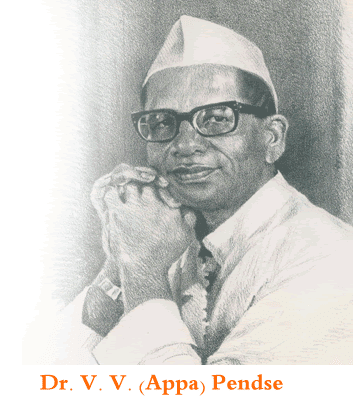Dr. Vinayak Vishvanath Pendse alias Appasaheb Pendse was a visionary educationist. As he was a true patriot, he took active participation in the freedom struggle. Immediately after independence was achieved he took upon himself the responsibility of rebuilding independent India. A doctor of philosophy, a dedicated volunteer, a visionary, a true leader, a musician, a devotee of Vedanta, an Excellence Award holder academician, a revolutionary an organizer, an inspirator, a writer, a journalist, a philosopher..., he was a multi-faceted personality having immense love in his heart for his motherland. He firmly believed that to accelerate the progress of India, motivated intellectuals were needed who would use their intelligence to awaken the society and transform India into a developed country. Thus with a purpose to nurture intelligence for social change, he founded Jnana Prabodhini Prashala for the gifted in 1962.
Dr. Vinayak Vishwanath Pendse alias Appa Pendse was a multi-dimensional personality. His was a life of education as an academician, an educationist, and a researcher; a life of action as a revolutionary, a journalist, a reformer, a leader, an administrator, an organizer, and an inspirator; a life of compassion as a psychologist, a counselor, a social worker, and a healer; a life of creativity as a writer, a musician, and a sports-director; a life of devotion and piety as a celibate a missionary a theologian and a life of contemplation as a thinker, an idealist a philosopher and a visionary. A thumbnail sketch of his self-directed, eventful life will provide a better understanding of his work.

Born in a Joint family on August 17, 1916, Vinayak was very sensitive and visionary in his childhood. He used to read a lot and think a lot. When he was ten years of age, Swami Shraddhananda, a great leader of India, was assassinated by a fanatic in Delhi. The news reached Pune and caused deep anguish in the heart of this young boy. A question arose in his mind - “Who will take Shraddhananda's place now? "I, I, I! I must do it !"- was the spontaneous outburst.
The whole atmosphere in India at the time was turbulent with anti-British agitation. The British Government appointed a Commission to be headed by Mr. Simon to study the situation and make recommendations. Pune was the first place to be visited by the Simon Commission. But a stormy welcome awaited the Commission there. Indians denounced it because all of its members were British and none Indian. Only the white men were expected to decide the fate of India as if a divine dispensation. To register their protest against this, the Puneites took out a black flag procession. The boy Vinayak Pendse, 12 years old, took a bold part in that procession shouting 'Simon, go back!' One among the thousand young and old patriots, he walked the long distance in hot sunlight.
As an adolescent, he became a passionate admirer of the fiery revolutionaries like Savarkar, Bhagat Singh, Rajguru, Sukhdeo, Chandrashekhar Azad, and others. Daily, he was making notes in his personal diary, "One day, I must become a revolutionary and wage a war against the imperialist forces. Not just personal acts of revenge and violence, not just small skirmishes here and there, but actually a full-scale war, in which the British army would be defeated and independence would be won."
At the age of 14, he took a solemn oath to himself: "I shall dedicate myself to the cause of the freedom of my country." At a tender age of winged days and during dreams, life was willfully committed to a thorny ideal.
This spontaneous spark was turned into a steady burning flame by a number of youth organizations. All the basic grooming of what Appa Pendse became, later on, was accomplished these days. First, he became a member of the National Boy Scout Movement, not of Baden Powel, but of the late Lala Lajpat Rai, a great revolutionary and a leader of the national standing. Then he joined the Mukteshwar Dal (i. e. the Army of National Liberation) in 1930. He also became a member of the Rashtriya Swyamsevak Sangh in 1932. He was also one of the first seven volunteers when the Rashtra Seva Dal was started by Shri. Sadubhau Godbole. He had his own group of friends who could play musical instruments in a band. He was present with this group in the procession taken out to felicitate Jawaharlal Nehru, the popular youth leader of that time, along with other volunteers of the Indian National Congress. He was also connected with the local revolutionaries. Thus, the eager mind of young Vinayak Pendse was soaking in the nourishing streams of inspiration from all possible fountains like the thirsty roots of a growing tree. Ideological differences among the youth organizations were not sharpened at that time. National freedom was the common objective.

Jnana Prabodhini